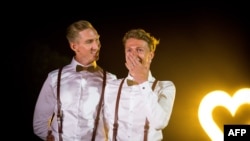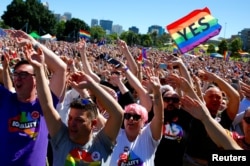Same-sex couples married in midnight ceremonies across Australia on Tuesday after the last legal impediment to gay marriage expired.
Most gay and lesbian couples were required to provide one month's notice of their intention to marry after marriage equality became law on Dec. 9, with overwhelming majority support of Parliament.
That made Tuesday the first possible date for gay marriages.
That notice period was waived for some couples who married in recent weeks. Those exceptional circumstances included a partner's terminal illness and overseas-based relatives booking flights to Australia before the official start date for the new law was known.
The Australian Parliament overwhelming voted for same-sex marriage after a nationwide postal survey that found in November that 62 percent of respondents wanted marriage equality.
Australia requires couples to give a month's notice for all weddings. State registry officials have long had the power to shorten that period for a range of exceptional circumstances including medical, religious, travel or legal grounds.
Athletes Craig Burns and Luke Sullivan married at a midnight ceremony near the east coast city of Tweed Heads.
"It's another way to show your love and appreciation of your partner in front of the people in your life," said Burns, a 29-year-old sprinter who will compete in the Commonwealth Games in Australia's Gold Coast in April.
In Newcastle, north of Sydney, Rebecca Hickson, 32, married her partner of nine years Sarah Turnbull, 34.
Hickson described the divisive buildup to the gay marriage survey as "a horrible time." She said the couple wanted to be part of history by becoming one of the first lesbian couples to marry in Australia.
In the west coast city of Perth, Kelly and Sam Pilgrim-Byrne solemnized their 24-year-old lesbian relationship in a midnight ceremony on the steps of the Western Australia state legislature.
"It was never anything we considered because it was never anything that was available to us, so we never had those dreams about what would our wedding look like, what would we do, who would we invite, where would it be — we never, ever considered it because we never thought that it would happen in our lifetime," Kelly Pilgrim-Byrne told the Australian Broadcasting Corp.
A week before the result of the survey was known, the U.N. Human Rights Committee criticized Australia for putting gays and lesbians "through an unnecessary and divisive public opinion poll."
The committee called on Australia to legislate for marriage equality regardless of the survey's outcome.





